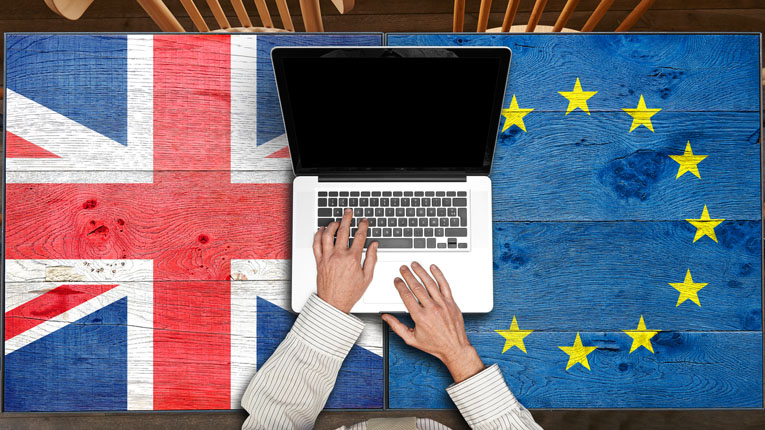How small businesses can navigate Brexit

Posted: Tue 24th Nov 2020
Arthur Lam, UK, Ireland & Nordics marketing director at UPS, shares his advice on how small businesses can best prepare for Brexit.
With the end of the Brexit transition period around the corner, uncertainties surrounding Brexit and the future trading relationship between the EU and the UK are still an overwhelming concern for many small businesses.
Research tells us that small and medium-sized enterprises (SMEs) in the UK are worried about regulatory changes, access to EU markets and increased import costs.
To deal with this, it's best to be proactive. There are a number of steps that you need to take now to prepare your business for Brexit. I've shared my top tips below to help ensure your business is well positioned to keep trading across the Channel after the end of the transition period on 31 December 2020.
Register for an Economic Operator's Registration and Identification (EORI) number
From 1 January 2021, if your business is trading between the UK and the EU, you'll need to be registered for an EORI number in both the UK and any one of the 27 EU countries (preferably in the same country where you register for EU import VAT to reduce the risk of border delays).
Having an EORI number will allow you to simplify your customs processes, prevent delays and avoid incurring extra costs.
Don't worry, it only takes about 10 minutes to apply for an EORI number, but be sure to apply in advance because it can take up to a week to process.
Check UK trade tariffs
Starting 1 January 2021, the UK Global Tariff will apply to all goods your business imports. However, there are some exceptions in place - check out the helpful tool on the UK government website to learn more and find out the UK Global Tariff you can expect to pay in the New Year.
Demystify value added tax (VAT)
It's important to understand the implications of Brexit on VAT. Who is liable for VAT payment depends on the incoterms and the payment terms of a shipment.
If you are exporting from the UK into the EU on your own behalf (e.g. incoterm Delivered Duty Paid), your business is liable for duty and import VAT, and if you are delivering directly to your customers, you will need an EU VAT registration.
You may wish to consider registering for VAT in the country of clearance. If you do not have an EU-based entity, you can do this through a fiscal representative. This is a service commonly offered by VAT consultants. If you do have an EU entity, then you can register yourself with the relevant local authority.
If you are importing into the UK you will also need a UK VAT registration. This can be done through the UK government website. Additionally, please keep in mind the following changes that the UK government is implementing regarding who is responsible for paying UK import VAT:
Starting 1 January 2021, shippers selling goods valued at or below £135 into the UK will be responsible for collecting and paying UK VAT for these shipments. The VAT amount should be collected at the point of sale and paid to HM Revenue and Customs through the UK VAT registration.
For goods sold into the UK valued above £135, the importer will remain responsible for paying the UK VAT. This can be paid by the importer via postponed VAT accounting or through the customs declaration.
Appoint an Importer of Record (IOR) if the consignee is not the declarant
The IOR is responsible for your customs declarations and ensures all goods are correctly valued and documented, all taxes and duties are paid and all required documentation and permits are properly completed.
For small businesses exporting to the EU, an IOR can either be an EU-based subsidiary, if they are part of the transaction, or an EU-based customs broker.
Familiarise yourself with the commercial invoice
If your business ships across customs borders, you must include a commercial invoice as the basis for your customs declaration. The commercial invoice itemises the products being shipped and includes a description and value of the goods, as well as shipper information, and is used by customs authorities to determine applicable duties and taxes.
From 1 January 2021, this will likely apply for all shipments between the UK, the EU and worldwide destinations.
Be sure to look out for the harmonised tariff codes of your products and the incoterms for your shipments.
Check out our useful guide on how to successfully complete a commercial invoice. I strongly recommend that you familiarise yourself with it now to ensure the information you provide for the commercial invoice is complete and accurate.
Submit your commercial invoice and important documentation electronically
Submitting your commercial invoice electronically, as well as other documentation required by customs, enables the clearance process to start before the goods arrive at the border.
Using online tools such as UPS Paperless™ Invoice will help you streamline and speed up customer clearance and shipment processing, eliminate redundant data entry, minimise the chance for error and reduce your environmental impact.
There's no doubt that, after 31 December 2020, Brexit will change the way you do business. You now have the information and tools you need to navigate this new landscape. If you are interested in exporting to other markets, check out the UPS for Small Business website, which will help you set up fast and easy shipping around the globe.
If all of this sounds like a lot to remember, don't worry - we have a bank of resources dedicated to helping businesses like yours prepare and feel more empowered for Brexit and beyond.
The information provided in this article does not, and is not intended to, constitute legal or other advice; instead, all information, content, and materials are for general informational purposes only. Information on this website may not constitute the most up-to-date legal or other information. Any links to other third-party websites are for the convenience of the reader, user or browser; UPS and its employees do not recommend or endorse the contents of the third-party sites.
Get business support right to your inbox
Subscribe to our newsletter to receive business tips, learn about new funding programmes, join upcoming events, take e-learning courses, and more.
Start your business journey today
Take the first step to successfully starting and growing your business.
Join for free
